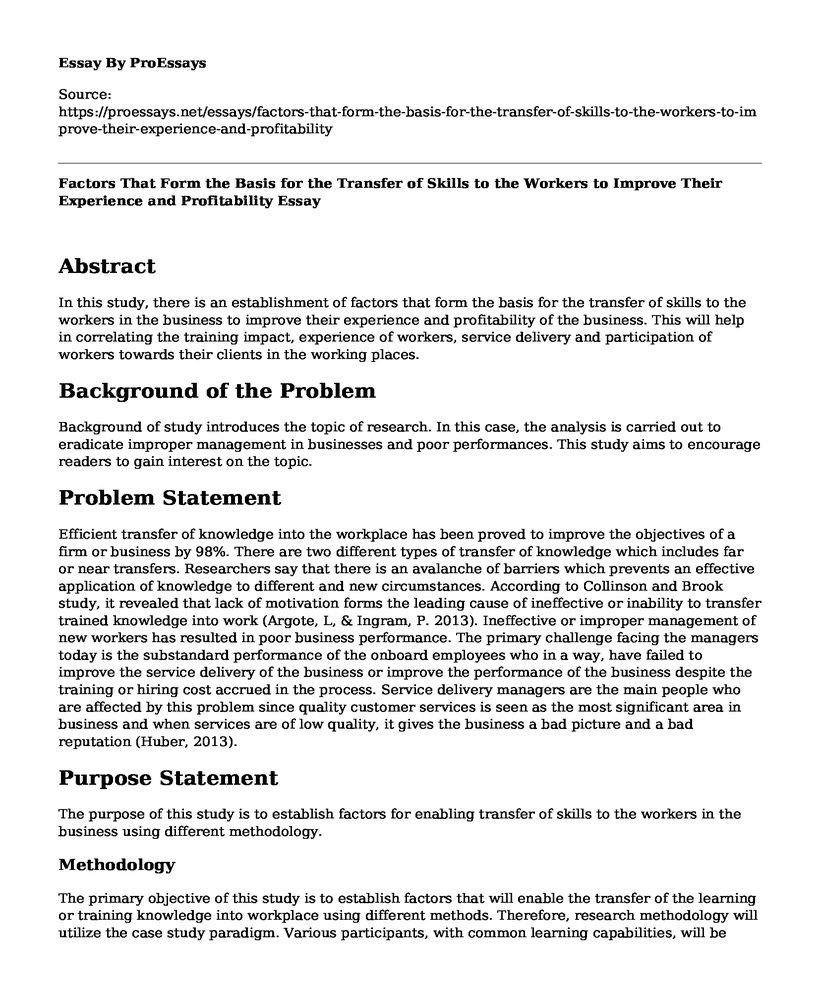Abstract
In this study, there is an establishment of factors that form the basis for the transfer of skills to the workers in the business to improve their experience and profitability of the business. This will help in correlating the training impact, experience of workers, service delivery and participation of workers towards their clients in the working places.
Background of the Problem
Background of study introduces the topic of research. In this case, the analysis is carried out to eradicate improper management in businesses and poor performances. This study aims to encourage readers to gain interest on the topic.
Problem Statement
Efficient transfer of knowledge into the workplace has been proved to improve the objectives of a firm or business by 98%. There are two different types of transfer of knowledge which includes far or near transfers. Researchers say that there is an avalanche of barriers which prevents an effective application of knowledge to different and new circumstances. According to Collinson and Brook study, it revealed that lack of motivation forms the leading cause of ineffective or inability to transfer trained knowledge into work (Argote, L, & Ingram, P. 2013). Ineffective or improper management of new workers has resulted in poor business performance. The primary challenge facing the managers today is the substandard performance of the onboard employees who in a way, have failed to improve the service delivery of the business or improve the performance of the business despite the training or hiring cost accrued in the process. Service delivery managers are the main people who are affected by this problem since quality customer services is seen as the most significant area in business and when services are of low quality, it gives the business a bad picture and a bad reputation (Huber, 2013).
Purpose Statement
The purpose of this study is to establish factors for enabling transfer of skills to the workers in the business using different methodology.
Methodology
The primary objective of this study is to establish factors that will enable the transfer of the learning or training knowledge into workplace using different methods. Therefore, research methodology will utilize the case study paradigm. Various participants, with common learning capabilities, will be placed on the standard training program and then different methods of transfer of knowledge will be tested.
Design.The research design will approach the experimental case study. Then the data collection on how first, the participants incorporate the knowledge quality into the work will be examined. The research will also focus on the gained experience before the training. Therefore, the participants of varying experience get considered. Additionally, the design will take two females and two males who possess knowledge in a specific area of service delivery and customer care positions.
Variables
The variables under study will be the years of experience and the duration of time the participants take to make an effective practice of knowledge learned. The independent variable will be, experience and the independent will be time taken to effectively transfer knowledge and method used to hire employees in the business.
Targeted population.The study will occur in a busy state, New York or any other place but under the context of service delivery.
Social change. The social change statement will strive to describe and relate the effect of training and service delivery and experience and how participants interact with clients.
Research Question(s)
The study objectives will be to establish the answers to the following questions which were developed to form the basis of the study.
* How do non-supportive managers affect knowledge transfer?
* What is the degree of efficacy if the participants associate with supportive clients and colleagues?
* Does person transfer knowledge effectively when left to operate on his own rather than be bothered by other people instructions?
* What is the efficacy of knowledge transfer by an experienced worker?
Professional Review
A professional review regards to any existing knowledge on the topic of study. According to Collinson and Brook study, a lack of motivation in working places results in ineffective or inability to transfer trained knowledge into work (Argote, L, & Ingram, P. 2013).
References
Argote, L. (2013). Organizational learning: A theoretical framework. In organizational Learning (pp.31-56). Springer, Boston, MA
Michael Huber, Regulation & Governance 7(2) 215-235, 2013.Mitchell, T.R. & Wood, R.E (2008). Supervisors response to poor subordinate performance: A test of an attributional model. Organizational Behavior and Human Performance, 25(1), 123-138.
Cite this page
Factors That Form the Basis for the Transfer of Skills to the Workers to Improve Their Experience and Profitability. (2022, May 23). Retrieved from https://proessays.net/essays/factors-that-form-the-basis-for-the-transfer-of-skills-to-the-workers-to-improve-their-experience-and-profitability
If you are the original author of this essay and no longer wish to have it published on the ProEssays website, please click below to request its removal:
- Research Paper on Production of Sparkling Shiraz Wine
- Baldrige Framework for a Transport and Logistics Company Paper Example
- Environmental Analysis for InspectPro Company Paper Example
- Leadership Experience as a High School Basketball Leader Paper Example
- Research Paper on Hip Hop Culture and Its Influence on Black Community and American Politics
- Essay Sample on Leadership in Organizations: Integrating Qualities & Values for Effective Results
- Essay on Carrier Corporation: System Thinking Powers Organizational Transformation







